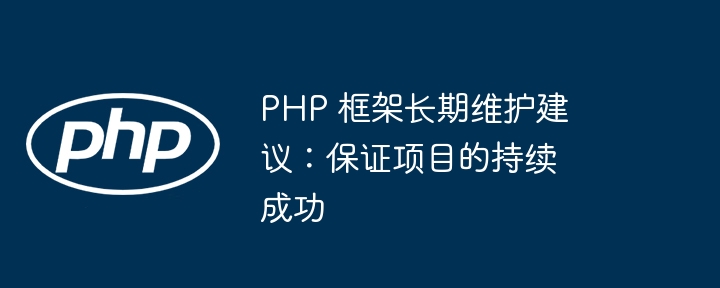
Best practices for long-term maintenance of PHP frameworks include timely updates, implementing continuous integration and deployment, code refactoring, unit testing, and monitoring and error reporting. These practices reduce downtime and ensure the health of the code base, thereby promoting the long-term success of the project.

Long-term maintenance suggestions for PHP framework to help the project continue to be successful
Introduction
PHP frameworks are essential in modern web development. However, maintaining the framework and underlying codebase over time is critical to ensure the continued success of the project. This article will outline best practices for long-term maintenance of PHP frameworks and provide practical examples.
Best Practices
1. Timely updates
Regularly update the framework and dependencies to address security vulnerabilities and bug fixes Crucial. Use a package manager like Composer to simplify the update process.
2. Continuous Integration and Deployment
Implement continuous integration and deployment pipelines to automatically build, test, and deploy code changes, thereby reducing the need for manual maintenance.
3. Code Refactoring
Over time, the code base can become cluttered. Regularly refactor code to improve its readability, maintainability, and performance.
4. Unit Testing
Writing unit tests to verify the key functions of the framework helps catch errors and ensure the reliability of the code.
5. Monitoring and error reporting
Configure tools (such as Sentry or New Relic) to monitor the project and report errors. This allows you to detect problems early and take action quickly.
Practical case: Maintain Laravel project
Regular update
Use Composer to run regularlycomposer update Command to update Laravel and its dependencies.
Continuous Integration
Set up a continuous integration pipeline using Travis CI or GitLab CI to automatically run unit tests and code quality checks every time code is pushed.
Code Refactoring
Use Laravel's artisan commands (such as optimize and style) to clean and refactor the code, Improve its performance and readability.
Unit Testing
Write PHPUnit tests to verify Laravel's core functionality such as routes, models, and controllers.
Monitoring and Error Reporting
Integrate Laravel using Sentry to capture errors and provide detailed reports.
Conclusion
By following these best practices, you can effectively maintain your PHP framework and ensure the long-term success of your project. By keeping up to date, employing automated processes, optimizing code, writing tests, and monitoring for errors, you can minimize downtime and maintain the health of your codebase.
The above is the detailed content of Recommendations for long-term maintenance of the PHP framework: ensuring the continued success of the project. For more information, please follow other related articles on the PHP Chinese website!